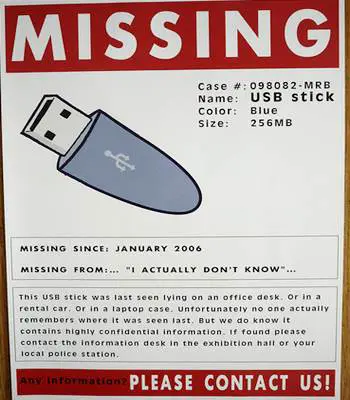Data management and data protection have become more important to a growing business than ever before. As more and more data is collected, storing and backing up that information properly becomes a necessity that many smaller businesses ignore until it is too late. So when the time comes to upgrade your data system and embrace the latest that technology has to offer, keep in mind some of the common ways that people lose data these days – and how to avoid these common problems:
 1) Hardware and OS Issues
1) Hardware and OS Issues
Sometimes something big goes wrong. One of the most common causes of data loss, even today, is a problem with hardware or the main operating system.
People kick, drop, or spill on hard drives and suddenly they can no longer access key data. Despite the growth of cloud data, hard drives and other nearby storage devices still hold plenty of important information, and are especially susceptible to physical problems.
On the OS side, while operating systems undergo rigorous testing they can still undergo failures and malfunctions, which can accidentally delete data from a hard drive – a major error that no business needs. This is why backup data remains such a key part of security.
2) Employee Mistakes
One of the other most common causes of data loss is simple employee error. Part of this occurs when employees do not really understand what they are doing and accidentally misplace or delete data when they really meant to do something else. Sometimes employees also forget to log data in the proper places or simply enter the wrong commands in a moment of inattention. The best solution for this problem is good employee training, but to err is still human.
[Suggested reading: How to Store Critical Data (or Where to Keep the Good Stuff?)]
3) Corrupted Files
While hardware is often a weak point in data management, software is not immune to its own faults. Software errors and malfunctions, often caused by some hidden mistakes in coding or formatting issues, can lead to corrupted files that cannot be retrieved. As more and more types of software hit the market try to all communicate with each other, this problem can grow more common. Fortunately, software quality has also risen to combat the problem.
4) Third Party Issues
Do you depend on a vendor for your server management or any data services? Cloud technology has many benefits, but it does put data in someone else’s hands – and sometimes that third party let you down. Vendors can misplace data, undergo software errors, or fail to design their solutions properly. The result is data that you thought was safe but is now suddenly unavailable, leaving you with an unpleasant customer service call. The best solution is prevention: Study your vendors and their reputations carefully before making a decision.
5) Malicious Activity
Viruses, malware, and similar digital attacks rarely destroy data outright – the goal these days is more often to steal the data. This leads to a sort of loss in its own right, since that financial information (or that list of passwords, etc.) needs to be replaced and updated in response. However, some malicious attacks do seek to simply destroy software and stored data, which may or may not be retrievable. Attacks do not need to come from the outside, either – angry employees may destroy far more data than distant hackers ever will.
6) Physical Disasters
Physical disasters are rare but they tend to have a very bad impact on data. This is especially true when data is concentrated in server rooms or other areas. A single fire, flood, earthquake or similar problem can immediately wipe out years worth of data. A robust backup system can help companies recover from this one.
Data lost is something nobody would want it to be happened as the consequences could be costly. We hope the above tips would serve as a reminder and help you to avoid such disaster. However, if you have had lost data, you can follow the instructions in this article to report the loss.
[Image credit: Craving Creativity, Flickr]




Good list. The scariest ones are the ones you really have no power over like malicious threats and disasters. Those things strike out of nowhere and the amount of damage they can inflict isn’t always limited to a specific area.
[ Smiles ] Informative as always, Peter.
Luckily, most companies have an IT department in case that sort of thing happens!
Makes those working in the IT department one of the best paid people around! 🙂
Hey Peter, I’ve had a couple of instances where I lost data due to misbehaving software. It is indeed scary to lose data. And depending upon its importance and the heaviness of the data, the whole experience can be a nightmare.
It is always good to have backups 🙂 Thanks for sharing!
Some people even do a backup for backups! Double protection I guess? Thanks for stopping by, Jane! 🙂
Nice information Peter !
Good to see manual mistakes being covered in this post . To avoid data loss , people should always backup their data on a trusted storage media where the data can be safe. Thanks for sharing the information mate .
-Pramod
Yes you are absolutely right, Pramod! And in that, I use an external HDD 🙂
I have a NAS at home that I regularly backup files to. I wanted it anyway to store other files on, so I figured it was worth while backing up my laptop’s contents to.
I have it set up to run a backup once a week.